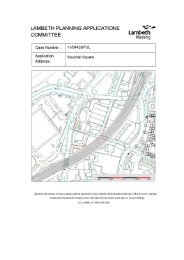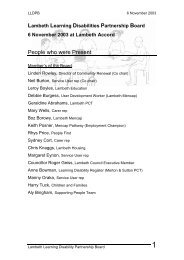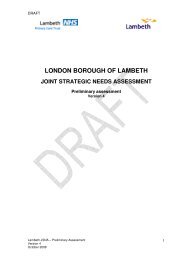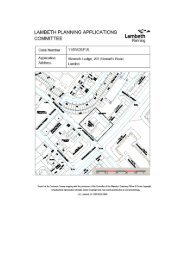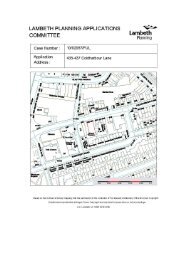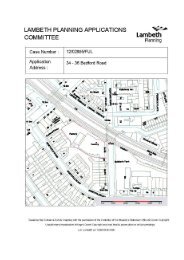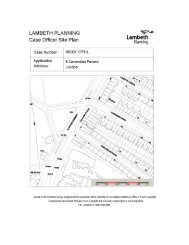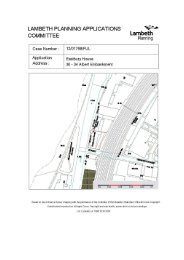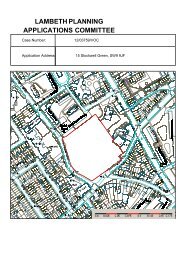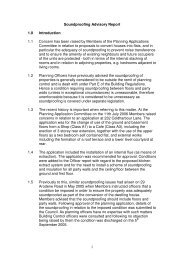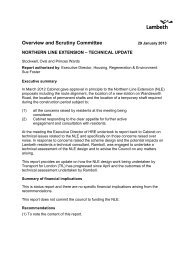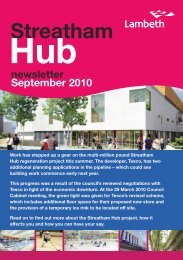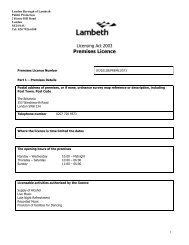London Plan 2011 PDF 1 MB - Lambeth Council
London Plan 2011 PDF 1 MB - Lambeth Council
London Plan 2011 PDF 1 MB - Lambeth Council
Create successful ePaper yourself
Turn your PDF publications into a flip-book with our unique Google optimized e-Paper software.
The <strong>London</strong> <strong>Plan</strong> July <strong>2011</strong> – RTF version<br />
For example, depending on the condition of wood, it may be better to<br />
generate energy using wood waste rather than to recycle it. In these cases<br />
the approach that will deliver the greater climate change benefits should be<br />
given preference. This <strong>Plan</strong>, and the Mayor’s waste strategies, set out<br />
policies to achieve this.<br />
5.66 The Mayor believes that making better use of waste has a major role to play<br />
in tackling climate change and that <strong>London</strong>’s waste is potentially a valuable<br />
resource that can be exploited for <strong>London</strong>’s benefit, and not solely a disposal<br />
problem. <strong>London</strong> cannot deal with these issues in isolation. The Mayor<br />
intends to work closely with neighbouring regions and local authorities to<br />
ensure these challenges and opportunities are addressed in the most<br />
environmentally friendly and effective ways possible. <strong>London</strong> has a leading<br />
part to play in ensuring this.<br />
5.67 With this in mind, <strong>London</strong> should manage as much of the capital’s waste<br />
within its boundaries as practicable, enabling <strong>London</strong> and <strong>London</strong>ers to<br />
receive environmental and economic benefits from its management. Likewise,<br />
the Mayor believes that boosting recycling performance and recovering<br />
energy from biomass will deliver environmental and economic benefits to<br />
<strong>London</strong>.<br />
POLICY 5.16 WASTE SELF-SUFFICIENCY<br />
Strategic<br />
A The Mayor will work with <strong>London</strong> boroughs and waste authorities, the<br />
<strong>London</strong> Waste and Recycling Board (LWaRB), the Environment Agency,<br />
the private sector, voluntary and community sector groups, and<br />
neighbouring regions and authorities to:<br />
a manage as much of <strong>London</strong>’s waste within <strong>London</strong> as practicable,<br />
working towards managing the equivalent of 100% of <strong>London</strong>’s waste<br />
within <strong>London</strong> by 2031<br />
b create positive environmental and economic impacts from waste<br />
processing<br />
c work towards zero biodegradable or recyclable waste to landfill by<br />
2031.<br />
B This will be achieved by:<br />
a minimising waste<br />
b encouraging the reuse of and reduction in the use of materials<br />
c exceeding recycling/composting levels in municipal solid waste<br />
(MSW) of 45 per cent by 2015, 50 per cent by 2020 and aspiring to<br />
achieve 60 per cent by 2031<br />
d exceeding recycling/composting levels in commercial and industrial<br />
waste of 70 per cent by 2020<br />
e exceeding recycling and reuse levels in construction, excavation and<br />
demolition (CE&D) waste of 95 per cent by 2020<br />
f improving <strong>London</strong>’s net self-sufficiency through reducing the<br />
proportion of waste exported from the capital over time<br />
g working with neighbouring regional and district authorities to coordinate<br />
strategic waste management across the greater south east of<br />
England.<br />
Page 153 of 310



